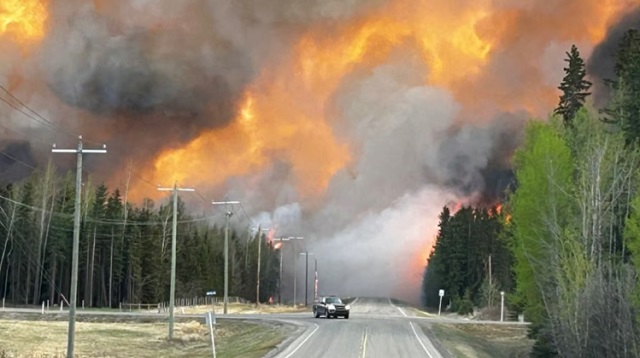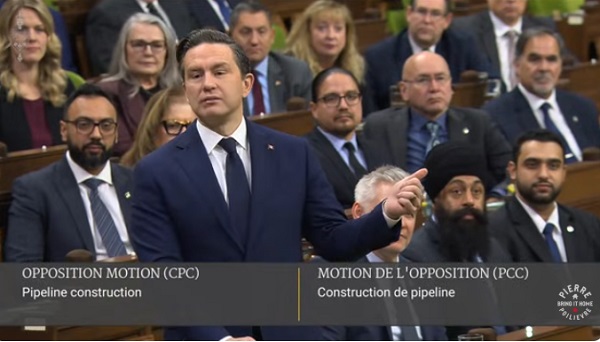Alberta
Thank the beetle and deadwood ‘fuel’ that should have been cleared

By Josh Andrus
Originally posted in the Western Standard
Parks Canada officials admit they failed to conduct controlled burns of dead pine trees, which now pose a significant fire risk.
While Ottawa fixates on climate change rhetoric, their neglect of forest fire prevention has left Alberta’s landscapes vulnerable to devastation.
Last week, a shining beacon of the beauty of our province was partially destroyed as a wildfire burned through the picturesque town of Jasper. Our thoughts and prayers go out to the victims.
Thankfully there has been no reported loss of life. But many people’s livelihoods have been wiped out. The question is how did this happen, and what could have been done to prevent it?
Smokey Bear’s famous saying was: “Only you can prevent forest fires.” And, in this case, proactive measures certainly could have made a difference.
Unfortunately, the entire federal government seems to have forgotten Smokey’s key point. Fire prevention on national park land is federal jurisdiction.
In 2022, Environment Minister Steven Guilbeault was informed that Parks Canada managers had not taken adequate precautions to protect the Town of Jasper from wildfires, according to documents obtained by Blacklock’s Reporter. At that time, Parks Canada officials admitted they had failed to conduct controlled burns of dead pine trees, which posed a significant fire risk.
“A mountain pine beetle infestation has brought significant changes to forests in Alberta, including Jasper National Park, with consequences for wildfire risk,” Guilbeault was informed.
Almost half of Jasper’s Whitebark Pine forest, 44%, was infected by beetles. However, few steps were taken to reduce the risk to the Town of Jasper with controlled burns of the surrounding forest, records show.
“Fire has not yet been applied for Whitebark Pine restoration,” stated a 2022 implementation report. “Mechanical thinning has been completed in 1.6 hectares, which is a small area relative to the amount of Whitebark Pine habitat.”
No reason was given for failing to take precautions. Since the fire, Guilbeault has made no public mention of the management reports.
Even though federal officials, including his department, knew the raging pine beetle was a serious hazard, Guilbeault blamed climate change: “As we are seeing in Canada and all around the world, we are seeing more and more aggressive forest fires,” he said on a media call on Monday.
Landon Shepherd, Incident Commander for Parks Canada, also attributed the intensity of the blazes to climate change: “This isn’t meant to be a discussion about climate change, but anyone who’s involved in fire management can tell you that things have become more difficult, especially in the last five years, to manage impacts.”
The 2022 warnings were not the first time concerns about a lack of fire prevention in national parks have been raised.
In 2018, CBC reported concerns from experts. Emile Begin and Ken Hodges, foresters for 40 years who had been studying Jasper National Park, found multiple issues with the forest that make it susceptible to a fire.
“You have fire suppression that has occurred for many years — therefore, you get a lot of dead fuel that would have been consumed by a natural process,” Hodges said. “The mountain pine beetle adds even more fuel to the situation.”
“You’ve got a major catastrophe on your hands if you get a match thrown into that.”
When pressed about the concerns, Alan Fehr, a superintendent for Jasper National Park, said: “We’re quite comfortable with where we are with our own emergency planning and evacuation planning.”
Hodges disagreed: “The potential that’s out there is actually scary. Hopefully, we’re wrong.”
Despite the repeated warnings of potential devastation due to forest management practices, Ottawa continues to point to climate change as the cause of the fires.
The Alberta government has been preparing, and increased its firefighting budget by more than 50% to $155.4 million this year. Alberta’s firefighting budget is now the highest it has ever been (despite misinformation about cuts.)
However, without proper fire prevention on national park land, blazes can become out of control quickly — as the warnings indicated.
Smokey Bear would be horrified. Clearly, Ottawa needs to spend less time interfering in provincial jurisdiction and more time focusing on things that actually are federal jurisdiction, like fire prevention in national parks.
Their inability to see the forest through the trees and take legitimate action to protect our national parks from the fury of an out-of-control wildfire demonstrates a degree of ineptitude that is, quite frankly, shocking.
Ottawa needs to stay in its lane and focus on its own jurisdiction, and they need to stop blaming climate change for their own ineptitude.
Alberta
They never wanted a pipeline! – Deputy Conservative Leader Melissa Lantsman

From Melissa Lantsman
Turns out the anti-development wing of the Liberal Party never stopped running the show.
Today, we’ll see if the Liberals vote for the pipeline they just finished bragging about.
Spoiler: they won’t. Because with the Liberals, the announcements are real, but the results never are.
Alberta
Premier Smith: Canadians support agreement between Alberta and Ottawa and the major economic opportunities it could unlock for the benefit of all

From Energy Now
By Premier Danielle Smith
Get the Latest Canadian Focused Energy News Delivered to You! It’s FREE: Quick Sign-Up Here
If Canada wants to lead global energy security efforts, build out sovereign AI infrastructure, increase funding to social programs and national defence and expand trade to new markets, we must unleash the full potential of our vast natural resources and embrace our role as a global energy superpower.
The Alberta-Ottawa Energy agreement is the first step in accomplishing all of these critical objectives.
Recent polling shows that a majority of Canadians are supportive of this agreement and the major economic opportunities it could unlock for the benefit of all Canadians.
As a nation we must embrace two important realities: First, global demand for oil is increasing and second, Canada needs to generate more revenue to address its fiscal challenges.
Nations around the world — including Korea, Japan, India, Taiwan and China in Asia as well as various European nations — continue to ask for Canadian energy. We are perfectly positioned to meet those needs and lead global energy security efforts.
Our heavy oil is not only abundant, it’s responsibly developed, geopolitically stable and backed by decades of proven supply.
If we want to pay down our debt, increase funding to social programs and meet our NATO defence spending commitments, then we need to generate more revenue. And the best way to do so is to leverage our vast natural resources.
At today’s prices, Alberta’s proven oil and gas reserves represent trillions in value.
It’s not just a number; it’s a generational opportunity for Alberta and Canada to secure prosperity and invest in the future of our communities. But to unlock the full potential of this resource, we need the infrastructure to match our ambition.
There is one nation-building project that stands above all others in its ability to deliver economic benefits to Canada — a new bitumen pipeline to Asian markets.
The energy agreement signed on Nov. 27 includes a clear path to the construction of a one-million-plus barrel-per-day bitumen pipeline, with Indigenous co-ownership, that can ensure our province and country are no longer dependent on just one customer to buy our most valuable resource.
Indigenous co-ownership also provide millions in revenue to communities along the route of the project to the northwest coast, contributing toward long-lasting prosperity for their people.
The agreement also recognizes that we can increase oil and gas production while reducing our emissions.
The removal of the oil and gas emissions cap will allow our energy producers to grow and thrive again and the suspension of the federal net-zero power regulations in Alberta will open to doors to major AI data-centre investment.
It also means that Alberta will be a world leader in the development and implementation of emissions-reduction infrastructure — particularly in carbon capture utilization and storage.
The agreement will see Alberta work together with our federal partners and the Pathways companies to commence and complete the world’s largest carbon capture, utilization and storage infrastructure project.
This would make Alberta heavy oil the lowest intensity barrel on the market and displace millions of barrels of heavier-emitting fuels around the globe.
We’re sending a clear message to investors across the world: Alberta and Canada are leaders, not just in oil and gas, but in the innovation and technologies that are cutting per barrel emissions even as we ramp up production.
Where we are going — and where we intend to go with more frequency — is east, west, north and south, across oceans and around the globe. We have the energy other countries need, and will continue to need, for decades to come.
However, this agreement is just the first step in this journey. There is much hard work ahead of us. Trust must be built and earned in this partnership as we move through the next steps of this process.
But it’s very encouraging that Prime Minister Mark Carney has made it clear he is willing to work with Alberta’s government to accomplish our shared goal of making Canada an energy superpower.
That is something we have not seen from a Canadian prime minister in more than a decade.
Together, in good faith, Alberta and Ottawa have taken the first step towards making Canada a global energy superpower for benefit of all Canadians.
Danielle Smith is the Premier of Alberta
-

 National19 hours ago
National19 hours agoLiberal bill “targets Christians” by removing religious exemption in hate-speech law
-

 Business2 days ago
Business2 days agoThe EU Insists Its X Fine Isn’t About Censorship. Here’s Why It Is.
-

 Business1 day ago
Business1 day agoCanada invests $34 million in Chinese drones now considered to be ‘high security risks’
-

 Bruce Dowbiggin2 days ago
Bruce Dowbiggin2 days agoWayne Gretzky’s Terrible, Awful Week.. And Soccer/ Football.
-

 Business15 hours ago
Business15 hours agoLooks like the Liberals don’t support their own Pipeline MOU
-

 Economy1 day ago
Economy1 day agoAffordable housing out of reach everywhere in Canada
-

 Health2 days ago
Health2 days agoCDC Vaccine Panel Votes to End Universal Hep B Vaccine for Newborns
-

 Business1 day ago
Business1 day agoThe Climate-Risk Industrial Complex and the Manufactured Insurance Crisis



